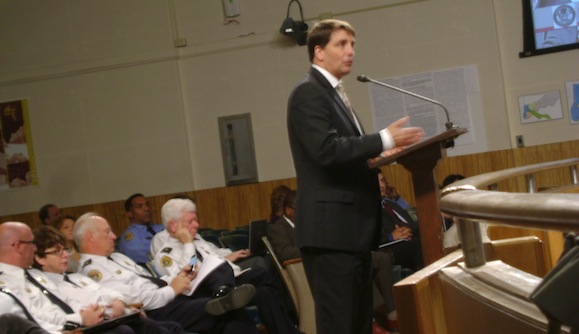
City Council Member Cynthia Hedge-Morrell told the city administration and New Orleans Police Department Wednesday afternoon that $7 million included in 2013’s budget to implement federally-mandated changes at NOPD was a “ripoff” financing “foolish consent decree stuff.”
Hedge-Morrell gave her blunt assessment of the proposed NOPD consent decree as the council asked city leaders why the Independent Police Monitor—a city-chartered police watchdog embedded in the Inspector General’s office—could not do a better, cheaper job than an outside court monitor that will be funded to the tune of $2 million next year.
The city two weeks ago submitted a proposed $491 million spending plan for 2013, and the City Council is engaged in exhaustive hearings over its contents.
A balanced budget must be signed off on by Dec. 1.
But Hedge-Morrell says she won’t play along. She said she was “not willing to take $7 million from other programs” to pay for reforms at NOPD.
“I’m tired of New Orleans being the subject of somebody’s arbitrary and capricious decisions,” said Hedge-Morrell, who has two sons in the police department.
The $7 million in “reserves for the consent decree” is a first-year down payment on what city leaders have said will be an eventual $55 million price tag over five years to fully implement the consent decree, aimed at a complete overhaul of the troubled agency.
The decree awaits the signature of federal Judge Susie Morgan, who has been fielding arguments from groups claiming they were cut out of the negotiations prior to its unveiling earlier this year—including the Office of the Independent Police Monitor.
This year’s $7 million allotment includes $2 million that will be paid to an outside court monitor.
Who that will be remains to be seen.
The City Attorney and federal Department of Justice are coordinating the review of proposals that have come in from companies around the nation.
Both Hedge-Morrell and Councilwoman Stacy Head wondered why the job wasn’t going to the Independent Police Monitor.
Deputy Independent Police Monitor Simone Levine told the council that it was up to the task—but also conceded that her agency isn’t funded fully enough to do the work it will be asked to do once the decree is in place.
“We see requirements we have to fulfill and abide by in the consent decree,” Levine said, “and we have identified the ones we can’t do because of lack of money. Nothing in the consent decree says IPM is excused from its duties because of lack of funding.”
The search for a consent decree court monitor (which, as a practical matter is not a single individual but a staff typically including lawyers, former federal officials, criminal-justice experts and technical support staff) began with a request for proposals issued by the city in early September.
After receiving only seven proposals by the Oct. 5 deadline, the city extended the request-for-proposals bidding period for another month to accommodate what it said were a number of would-be court monitors who had not been aware of the original the process and wanted time to submit bids of their own.
Hedge-Morrell blasted the Landrieu Administration for its failure to consider the Independent Police Monitor for the job.
She further charged that the police monitor, Susan Hutson, was iced-out of negotiations between the city, NOPD and Department of Justice that yielded a wide-ranging document with some 450 separate demands for change in policing practices.
City Attorney Richard Cortizas and Chief Administrative Officer Andy Kopplin rebuffed Hedge-Morrell’s characterization of their efforts on behalf of the Independent Police Monitor. They agreed that Hutson hadn’t been invited to the negotiating table but said the Department of Justice had stipulated that only parties to the negotiations attend.
Cortizas and Kopplin told Hedge-Morrell they tried to get the city’s Independent Police Monitor the job of court monitor but were told by the Department of Justice that doing so would lead to a duplication of efforts and costs. The outside monitor was a requirement made by the feds, Kopplin said.
The $7 million budgeted for consent decree is in addition to the New Orleans Police Department’s proposed budget for 2013 of $132.4 million.
The NOPD is the only major city department getting an increase over the amount provided in the 2012 budget—$129 million.
Most of the $7 million in the separate “consent decree” budget covers three anticipated expenditures:
- $2 million for the court-appointed monitor. The city accepted bids from seven companies but reopened the request for proposals for an additional month; the new deadline is this Friday.
- $1.4 million for an in-car camera system mandated under the terms of the consent decree.
- $1.3 million for Automatic Vehicle Locator (AVL) technology and mobile data terminals for police cruisers.
The budget also includes $600,000 for the purchase of up to 460 additional Tasers to supplement the 800-plus currently deployed by NOPD.
Police Superintendent Ronal Serpas said the Taser purchases would mean every officer would now be carrying one of the stun guns.
Serpas’ budget from the city is sufficient to pay for 1,260 uniformed police officers in 2013. He said he’d like that number to be closer to 1,575.
The city council peppered Kopplin and Serpas with demands that they pledge to fully fund 1,260 officers throughout 2013—and not let an annual attrition rate of about 100 overtake new hires, as happened this year.
The department closely watches its attrition rate, said Serpas, and will initiate a new training class when it sees a chance that the number of officers could fall below what’s been agreed on in the budget.
Jackie Clarkson also asked Serpas to make a pledge that he would have a firing range ready to go for training officers by Jan. 1.
Officer trainees have not had a firing range at the training academy since Hurricane Katrina.
Serpas did not take Clarkson’s pledge but said he was working on it.


